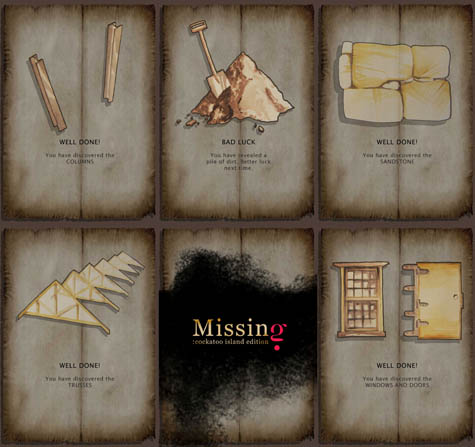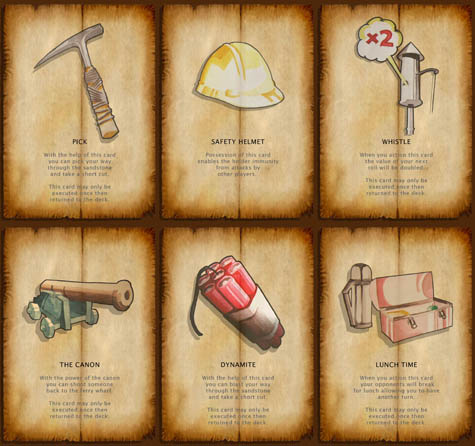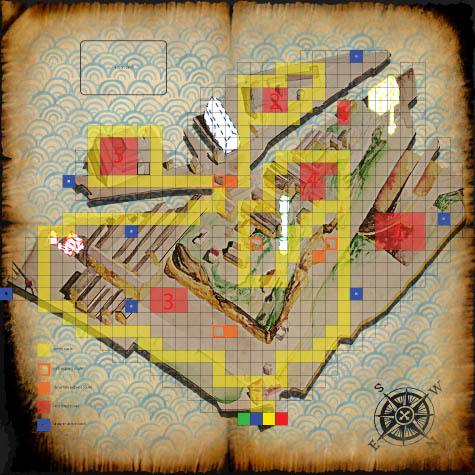The Missing Buildings of Cockatoo Island
 [Image: Playing Tristan Davison's Missing: Cockatoo Island Edition].
[Image: Playing Tristan Davison's Missing: Cockatoo Island Edition].I'm excited finally to look back at some of the work produced by my students at Urban Islands last month in Sydney, not only to bring them much deserved attention but to show how the course itself worked out.
So, with the caveat that it has been extremely difficult for me to find reliable internet access here, and that this will only get worse over the next ten days as my wife and I head north into Daintree National Park, I wanted to take advantage of some blazing wifi to start a review of the studio's most stimulating projects.
Here, then, kicking things off, is an entire board game, called Missing: Cockatoo Island Edition, invented, painted, and produced in less than a week by Tristan Davison.
Missing uses Cockatoo Island – the abandoned industrial site, former shipbuilding yard, and derelict prison in the Sydney Harbor that formed the site of Urban Islands – as its primary setting and game-play environment.
 [Image: Missing: Cockatoo Island Edition by Tristan Davison].
[Image: Missing: Cockatoo Island Edition by Tristan Davison].The object of the game is to re-assemble the missing buildings of Cockatoo. Players progress by strategically accumulating Action Cards and Building Cards, with the game concluding atop the island's central sandstone plateau.
Cockatoo, for those of you who have not visited the site, is an island somewhat famously denuded of many of its former historic structures. Indeed, the island's lost buildings are some of its most conspicuous features, their interiors still framed with a grid of iron rails in the flattened ground.
 [Images: Building Cards from Tristan Davison's Missing: Cockatoo Island Edition, produced in less than one week].
[Images: Building Cards from Tristan Davison's Missing: Cockatoo Island Edition, produced in less than one week].If it's not visibly obvious, by the way, I should say that Tristan is jaw-droppingly talented, producing this entire game and many other pieces over the course of Urban Islands right there in the studio, using watercolor and ink. I was able actually to watch as many of these were outlined and colored.
 [Images: Action Cards from Missing: Cockatoo Island Edition].
[Images: Action Cards from Missing: Cockatoo Island Edition].The board itself is incredible, for instance, layering the pathway of the game atop an aerial view of Cockatoo Island and including various safety zones that can be exploited by players along the way.
 [Images: The board of Tristan Davison's Missing: Cockatoo Island Edition].
[Images: The board of Tristan Davison's Missing: Cockatoo Island Edition].Over the coming weeks, expect to hear more about the basic interpretive mechanism at work behind the studio, which will help to explain why Tristan produced a board game in the first place. For now, the sheer handiwork on display here, and the rapid evolution of what were basically improvised game rules, continues to amaze me.
Stay tuned for more student projects from Urban Islands!





Comments are moderated.
If it's not spam, it will appear here shortly!
Neat, it reminds me of 'Zombie Plague' :)
btw, unless you're making a clever religious joke, you might want to spellcheck the 'Canon' action card. :)
I'd love to know what the rules are for this game. Are those likely to become available?
Wow! sitting on Cockatoo Island at the moment. The Biennale of Sydney staff would love to get a copy of this game! it is beautiful Tristan.
Post a Comment